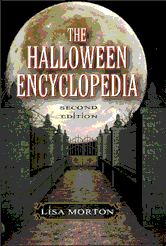Digging up hard facts on mythical monsters can be tricky, but we offer several reference titles to help your users avoid the curse of faulty research. Here are a few titles from our Core and One-time Purchase collections that you can use to inspire other-wordly research in this, the spookiest of seasons.
Duncan Whitmire
Recent Posts
We understand your library wants to post fun content to social media but that you might not have the time to dedicate to writing it, so we’d like to help!
Below you will find daily posts, all under Twitter’s 140 character limit (we'll stick with 140 until everyone is on the 280 train), that you can copy/paste at your leisure, each linking to a Topic Page, which, for Credo Online Reference Services subscribers can be a gateway to all kinds of e-resources.
The third installment of our Credo in Action webinar series featured two Fresno State librarians, Ray Pun and Vang Vang, discussing new and innovative ways to engage students through gamification, visual literacy, and more. With clear and practical examples, they walked us through how they’ve implemented these various strategies to expand their instruction and outreach services. Here are a few of the highlights; access the full recording and slides to see all 10!
Webinar Recap: Pre-search to Research, Credo as ‘Academic Google’
Niketha McKenzie was tasked with creating an instructional platform to ensure Howard University’s incoming freshmen were aware of the library’s resources and services. She and her colleagues Adia Coleman and Kimberly Prosper reached out to faculty and students to assess the main obstacles first year students faced when conducting research, and where faculty wanted to improvement. As part of our Credo In Action webinar series, these librarians agreed to share what they learned, what they’ve created to address these needs, and how students and faculty have responded. Access the full webinar recording here!
First Year Experience, Information Literacy, Credo in Action, Webinars
Don't Take the Clickbait – Practical Ways to Recognize and Fight Fake News (Webinar Recap)
The second installment of our Credo In Action webinar series featured librarians Darcy Gervasio and Emily Carlin of SUNY Purchase College discussing how they combat fake news. Watch the webinar recording here, and view the slides here.
We understand your library wants to post fun content to social media but that you might not have the time to dedicate to writing it, so we’d like to help!
Below you will find daily posts, all under Twitter’s 140 character limit (good for Facebook too), that you can copy/paste at your leisure, each linking to a Topic Page, which, for Credo Online Reference Services subscribers can be a gateway to all kinds of e-resources.
In the era of fake news, biased media, and dubious websites, information literacy (IL) has come to the forefront of essential 21st century skills. Whether strating a paper, or attempting to discern the validity of the Facebook meme a friend posted, the ability to find, evaluate, and use information effectively and responsibly has never been more important. We asked academic librarians how they use Credo Online Reference Service and InfoLit Modules in their IL instruction, and this is what they told us:
Pre-search to Research: How One Library is Using Credo as “Academic Google”
When Howard University decided it was time to streamline their First Year Experience program and create an FYE librarian, they tasked Niketha McKenzie with creating an instructional platform to ensure incoming students were aware of the library’s resources and services. Professors asked her to use her one-shots to introduce students to the library’s databases, but McKenzie noticed a fundamental gap in students’ readiness to conduct that level of scholarly research.
For many students, the hardest part of writing a paper is getting started. Oftentimes either can’t settle on a topic, or they feel overwhelmed by the volume and complexity of the information out there. We asked librarians to write to us about how Credo helps their students start their research, and this is what we heard back:
As children we were promised flying cars, hoverboards, and conveyor belts to shower and dress us each morning. Until now, you’d be forgiven if you were disappointed that all we’ve gotten so far are increasingly sophisticated ways to argue with strangers and hail rides. Library Extension, the browser tool that gives you a heads up when your local library has the book you’re about to buy, changes everything.


/Images/saso-tusar-130051.jpg)
/Images/PunVangPics.jpg)
/Images/PresearchTitleSlide.jpg)
/Images/clickbait_titleslide.jpg)
/Images/AutumnTrees.jpg)
/Images/20432639196_73396c6b0d_z.jpg)

/Images/19836785704_829869e934_z.jpg)
/Images/LElogo.png)